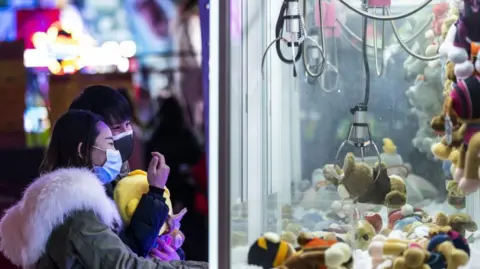Gotta catch 'em all: Hong Kong targets 'unfair' claw machines
 Getty Images
Getty ImagesIt's a frustratingly familiar experience for many a fair-goer: just as the coveted plushie makes its way towards the chute of a claw machine, the claw slackens, letting go of the prize.
But now one city has had enough. On Wednesday, Hong Kong's consumer watchdog called for a review of regulations on claw machines after rising complaints.
One man had spent HK$500 ($64.4; £50.7) over 45 minutes to win a waffle maker but got "nothing more than a few trinkets", the Consumer Council said.
It said these machines "capitalise on consumers' enthusiasm for testing their luck" and warned people to "spend rationally and be mindful of addiction". But it did not say how it would regulate them.
Forty-two complaints were filed in the first 11 months of this year, up from 16 in 2023 and seven in 2022, the Consumer Council said on Monday.
"The industry often modifies claw settings or introduces obstacles inside claw machines to make winning more challenging... Excessive difficulty or unfair settings could aggravate consumers," the council said in a statement on Monday.
"We believe it's about time to review whether we should regulate claw machine businesses," said Gilly Wong Fung-han, the council's chief executive, said reports.
But Jayden Chen, the founder of a claw machine rental company in Singapore, tells the BBC that programmed claw machines are "actually part of the fun".
"The players then feel the excitement and adrenaline, and will keep going. If they are winning most of the time, who would try for a second or third time?
"Regulations will kill off the fun element," Mr Chen said.
In Hong Kong, claw machine operators do not need a license to set up shop.
In the case of the man who bided for the waffle maker, he had used a claw machine that promised "instant prizes" - the waffle maker was among the array of prices displayed and he had believed that consumers should have the right to select their reward.
A woman, who played another claw machine, complained that each time she was about to move her desired toy towards the chute, the claw would slacken, letting go of the toy.
The machine featured a "guaranteed grab" mechanism for players who had spent at least HK$100 without winning - only in their next try would the claw maintain its grip until the toy is extracted. The woman lamented that this was a "dishonest trade practice".
Reports have shown that claw machines can be programmed to have a strong grip for only part of the time, or for it to drop a prize only after a certain number of tries.
In yet another example given by the council, a third complainant had wanted to break his HK$100 bill into HK$5 coins inside a claw machine arcade. After inserting the bill, however, he received only one HK$5 coin. His request for a refund was denied, and he was instead "compensated" with an equivalent value in play rounds.
The man protested, calling this a case of "forced consumption", but the operator upheld its decision not to issue a cash refund, saying the coin exchange "incurred operating costs such as bank fees".
"Consumers should assess whether the total amount spent is worth the value of the desired prize," it said.
It also advised consumers to video-record their gameplay so that they have some evidence on hand in case of any disputes.
It added that some claw machines are suspected to have been used for gambling activities and urged consumers to exercise caution.